2019年英语中级翻译资格考试笔译冲刺练习题(7)
- 格式:docx
- 大小:39.68 KB
- 文档页数:4
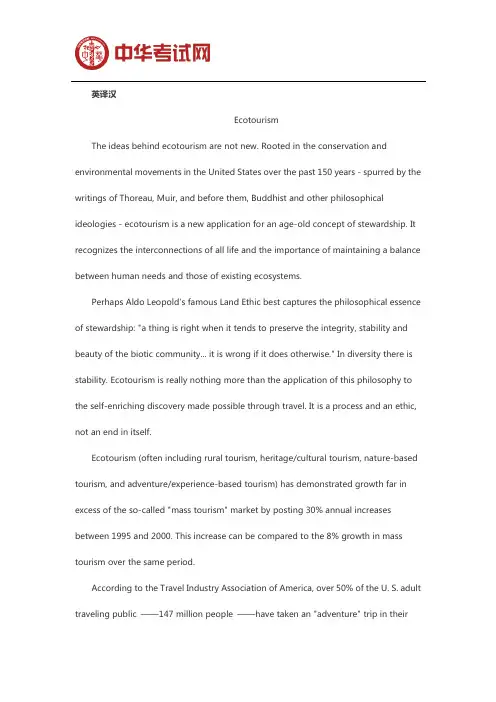
英译汉EcotourismThe ideas behind ecotourism are not new. Rooted in the conservation and environmental movements in the United States over the past 150 years - spurred by the writings of Thoreau, Muir, and before them, Buddhist and other philosophical ideologies - ecotourism is a new application for an age-old concept of stewardship. It recognizes the interconnections of all life and the importance of maintaining a balance between human needs and those of existing ecosystems.Perhaps Aldo Leopold's famous Land Ethic best captures the philosophical essence of stewardship: "a thing is right when it tends to preserve the integrity, stability and beauty of the biotic community... it is wrong if it does otherwise." In diversity there is stability. Ecotourism is really nothing more than the application of this philosophy to the self-enriching discovery made possible through travel. It is a process and an ethic, not an end in itself.Ecotourism (often including rural tourism, heritage/cultural tourism, nature-based tourism, and adventure/experience-based tourism) has demonstrated growth far in excess of the so-called "mass tourism" market by posting 30% annual increases between 1995 and 2000. This increase can be compared to the 8% growth in mass tourism over the same period.According to the Travel Industry Association of America, over 50% of the U. S. adult traveling public ——147 million people ——have taken an "adventure" trip in theirlifetime. Included on this "adventure" activity roster are camping, hiking and biking. Though a small portion of the overall tourism industry, ecotourism's profit margin tends to exceed that of mass tourism. Last year, the average ecotourism two-week package cost is $ 3,500.Ecotourism has both the potential to change the way we view travel and to provide the means to care for our diverse and rich resources. Western society (about l.2 billion people) cannot bring the remaining 5.l billion people in less developed countries up to the Western consumptive "standard of living" without exhausting the earth's resources. Ecotourism creates a situation where both the West and the less developed societies can converge toward the middle. Ecotourism is the "common ground" because it fundamentally changes the economic dynamics of business. Ecotourism recognizes the ecological and cultural costs of doing business as well as champions "local economy", i.e., the community becomes strong and cohesive by what's developed and sustainably managed on a local level.As a part of the service industry, ecotourism promotes what Alan During, in his important book How Much is Enough? calls the "shift from material to non-material ends". This shift is the only viable way in which human demands made on the environment will not overrun the carrying capacity of the planet. is Ecotourism is in fundamental opposition to consumption as a means to fulfillment; rather, the sense of place, the excitement of experience, and the opportunity of learning become the overriding products " sold" to ecotourists. These ecotourism "products" are based uponpreserving and protecting the original cultures and environments, not upon transforming them into some Disneyland-like fantasy-world.Increasingly, a conservation ethic and a viable process of development have emerged from the ecotourism movement, or perhaps vice versa. The ecotourism ethic has been defined by the Ecotourism Society to mean: "responsible travel that conserves the natural environs and sustains the well-being of local people. Ecotourism offers travelers the means to assist personally and locally in the conservation of threatened environments and to support communities directly that are seeking viable economic alternatives to cycles of poverty and environmental destruction." This non-profit organization is working to raise public support for implementing ecotourism principles and practices around the world.The concerted effort by policy makers, businesses, recreation managers and organizations such as the World Wildlife Fund and Conservation International to define and make ecotourism a mainstream practice is promising. We in the Western industrialized nations have an incredible opportunity for restorative and regenerative change through ecotourism. There seems to be little doubt that tourism will continue to grow; the most important question remains: Will it be ecologically responsible and sustainable?The responsibility clearly rests with ourselves to care for an environmental and cultural diversity which historically we have used merely to serve our needs - and our needs only. Ecotourism, as a model, process and ethic, offers an opportunity to putrespect for our earth into practice in a way that all people can enjoy its beauty and benefits.参考译文生态旅游生态旅游的理念并不新鲜,它是在梭罗、缪尔的著述、以及之前的佛教等思想体系的启发下形成的,并植根于美国150年来的野生动物和环境保护运动中,是一种对古老的资源管理概念的新的发挥。
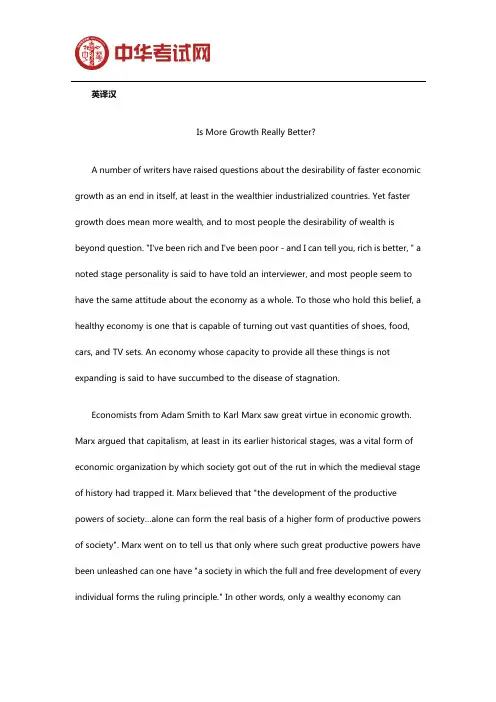
英译汉Is More Growth Really Better?A number of writers have raised questions about the desirability of faster economic growth as an end in itself, at least in the wealthier industrialized countries. Yet faster growth does mean more wealth, and to most people the desirability of wealth is beyond question. "I've been rich and I've been poor - and I can tell you, rich is better, " a noted stage personality is said to have told an interviewer, and most people seem to have the same attitude about the economy as a whole. To those who hold this belief, a healthy economy is one that is capable of turning out vast quantities of shoes, food, cars, and TV sets. An economy whose capacity to provide all these things is not expanding is said to have succumbed to the disease of stagnation.Economists from Adam Smith to Karl Marx saw great virtue in economic growth. Marx argued that capitalism, at least in its earlier historical stages, was a vital form of economic organization by which society got out of the rut in which the medieval stage of history had trapped it. Marx believed that "the development of the productive powers of society…alone can form the real basis of a higher form of productive powers of society". Marx went on to tell us that only where such great productive powers have been unleashed can one have "a society in which the full and free development of every individual forms the ruling principle." In other words, only a wealthy economy canafford to give all individuals the opportunity for full personal satisfaction through the use of their special abilities in their jobs and through increased leisure activities.Yet the desirability of further economic growth for a society that is already wealthy has been questioned on grounds that undoubtedly have a good deal of validity. It is pointed out that the sheer increase in quantity of products has imposed an enormous cost on society in the form of pollution, crowding, proliferation of wastes that need disposal, and debilitating psychological and social effects. It is said that industry has transformed the satisfying and creative tasks of the artisan into the mechanical and dehumanizing routine of the assembly line. It has dotted our road sides with junkyards, filled our air with smoke, and poisoned our food with dangerous chemicals. The question is whether the outpouring of frozen foods, talking dolls, radios, and headache remedies is worth its high cost to society. As one well-known economist put it: The continued pursuit of economic growth by Western Societies is more likely on balance to reduce rather than increase social welfare…Technological innovations may offer to add to men's material opportunities. But by increasing the risks of their obsolescence it adds also to their anxiety. Swifter means of communications have the paradoxical effect of isolating people; increased mobility has led to more hours commuting; increased automobilization to increased separation; more television to less communication. 10 In consequence, people know less of their neighbors than ever before.Virtually every economist agrees that these concerns are valid, though many question whether economic growth is their major cause. Nevertheless, they all emphasize that pollution of air and water, noise and congestion, and the mechanization of the work process are very real and very serious problems. There is every reason for society to undertake programs that grapple with these problems.参考译文经济发展得越快越好吗?近年来,不少人或撰文或著书,已经提出质疑:为经济而发展经济,至少在较富裕的工业化国家究竟有无必要?诚然,经济增长得越快的确意味着更多的财富,而且大多数人都追求财富,这是勿庸置疑的。
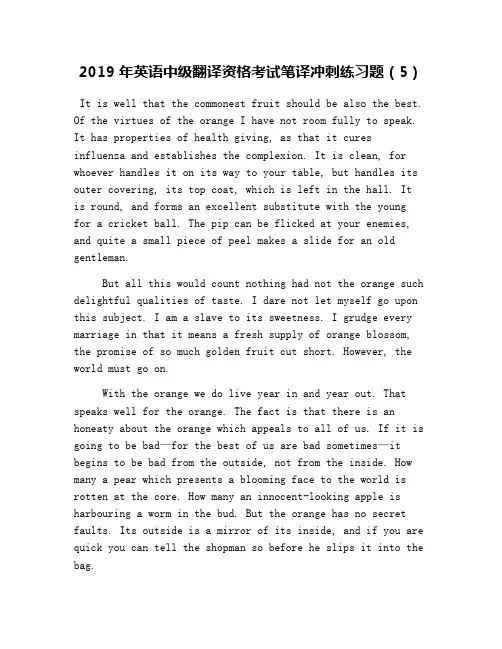
2019年英语中级翻译资格考试笔译冲刺练习题(5)It is well that the commonest fruit should be also the best. Of the virtues of the orange I have not room fully to speak. It has properties of health giving, as that it cures influenza and establishes the complexion. It is clean, for whoever handles it on its way to your table, but handles its outer covering, its top coat, which is left in the hall. Itis round, and forms an excellent substitute with the youngfor a cricket ball. The pip can be flicked at your enemies, and quite a small piece of peel makes a slide for an old gentleman.But all this would count nothing had not the orange such delightful qualities of taste. I dare not let myself go upon this subject. I am a slave to its sweetness. I grudge every marriage in that it means a fresh supply of orange blossom, the promise of so much golden fruit cut short. However, the world must go on.With the orange we do live year in and year out. That speaks well for the orange. The fact is that there is an honeaty about the orange which appeals to all of us. If it is going to be bad—for the best of us are bad sometimes—it begins to be bad from the outside, not from the inside. How many a pear which presents a blooming face to the world is rotten at the core. How many an innocent-looking apple is harbouring a worm in the bud. But the orange has no secret faults. Its outside is a mirror of its inside, and if you are quick you can tell the shopman so before he slips it into the bag.参考译文:1 说来也巧,这种最普通的水果恰恰是的水果。
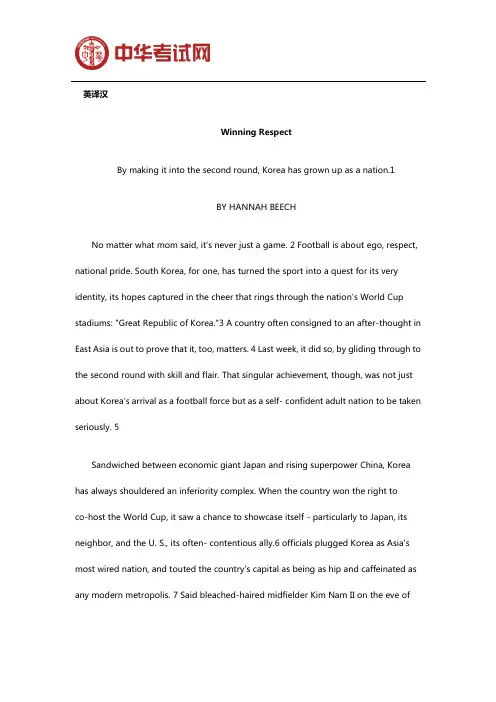
英译汉Winning RespectBy making it into the second round, Korea has grown up as a nation.1BY HANNAH BEECHNo matter what mom said, it's never just a game. 2 Football is about ego, respect, national pride. South Korea, for one, has turned the sport into a quest for its very identity, its hopes captured in the cheer that rings through the nation's World Cup stadiums: "Great Republic of Korea."3 A country often consigned to an after-thought in East Asia is out to prove that it, too, matters. 4 Last week, it did so, by gliding through to the second round with skill and flair. That singular achievement, though, was not just about Korea's arrival as a football force but as a self- confident adult nation to be taken seriously. 5Sandwiched between economic giant Japan and rising superpower China, Korea has always shouldered an inferiority complex. When the country won the right toco-host the World Cup, it saw a chance to showcase itself - particularly to Japan, its neighbor, and the U. S., its often- contentious ally.6 officials plugged Korea as Asia's most wired nation, and touted the country's capital as being as hip and caffeinated as any modern metropolis. 7 Said bleached-haired midfielder Kim Nam II on the eve ofKorea's 2002 debut: "We want to show we are a team - and a nation - that can compete with the best, and win."8The squad began with a historic triumph over sluggish Poland, then found itself face to face with the U.S. Korea's relations with America have long seesawed between peace and peril.9 Although America fought on the side of the South during Korea's civil war, the 37,000 U. S. troops still stationed in the country have strained relations with their hosts. 10Perhaps the most contentious issue in modern U. S. -Korea relations stems from a little-known pastime called short-track speed skating. Earlier this year at Salt Lake City, the nation's top hope Kim Dong Sung was disqualified for blocking a U. S. skater. In a move that most Koreans consider fixed, the American, Apolo Anton Ohno, took the gold instead. 11 He's since been voted the most unwelcome foreigner in a Korean poll. When Korean midfielder Ahn Jung Hwan headed the ball home in the 77th minute of the U. S. -Korea match to tie the score l-1 and keep the country's hopes of advancement alive, his post-goal showboating gave way to the sweeping arm motions of a speed skater. 12 "People felt bad about the Ohno incident," says Ahn. "I wanted to fix that. "1-3 Score one for Korean pride.The nation's next big test came in a do-or-die match on Friday night, when South Korea faced a star-studded side from Portugal. The Koreans needed at least a draw to guarantee advancing further in the Cup. Just hours before, Japan had qualified for thesecond round by dispensing with the hapless Tunisians. The possibility that Japan would advance while Korea stayed behind horrified the nation. Japan, after all, has perennially looked down upon its smaller neighbor, and brutally occupied it from 1910 to 1945.Since then, Korea feels like it has been stuck playing catch-up to the world's second-largest economy.It needn't have fretted. In the 69th minute of the match, midfielder Park Ji Sung deftly executed one of the prettiest strikes of the Cup. As fire-works flashed overhead, more than 400,000 citizens poured onto the streets of Seoul to celebrate. Only one thing could possibly put a damper on the beer-soaked crowds14: the U. S. too had advanced to the second round, precisely because Park's goal had relegated the Portuguese. But for once, the Koreans felt no twinge of insecurity. "We are both powerful now," says 36-year-old reveler Lee So Jung. "We can celebrate together." For the Koreans, victory has brought maturity.参考译文赢得尊严世界杯闯入第二轮,韩国人由此获自尊汉纳·比奇我妈妈总是说,足球只是一种游戏,可事实并非如此。
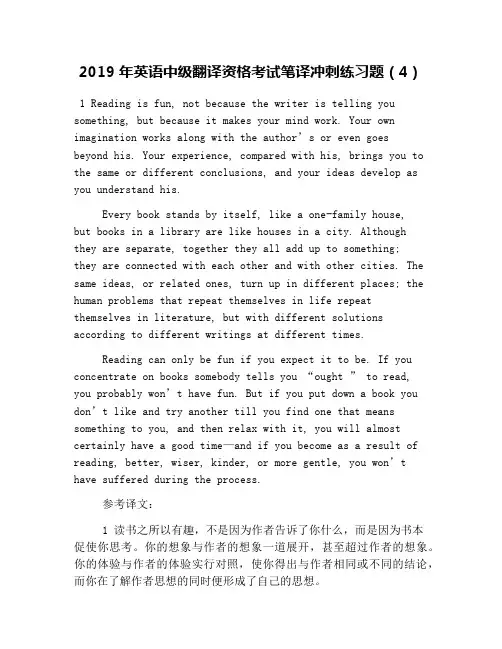
2019年英语中级翻译资格考试笔译冲刺练习题(4)1 Reading is fun, not because the writer is telling you something, but because it makes your mind work. Your own imagination works along with the author’s or even goesbeyond his. Your experience, compared with his, brings you to the same or different conclusions, and your ideas develop as you understand his.Every book stands by itself, like a one-family house,but books in a library are like houses in a city. Althoughthey are separate, together they all add up to something;they are connected with each other and with other cities. The same ideas, or related ones, turn up in different places; the human problems that repeat themselves in life repeat themselves in literature, but with different solutions according to different writings at different times.Reading can only be fun if you expect it to be. If you concentrate on books somebody tells you “ought ” to read, you probably won’t have fun. But if you put down a book you don’t like and try another till you find one that means something to you, and then relax with it, you will almost certainly have a good time—and if you become as a result of reading, better, wiser, kinder, or more gentle, you won’t have suffered during the process.参考译文:1 读书之所以有趣,不是因为作者告诉了你什么,而是因为书本促使你思考。
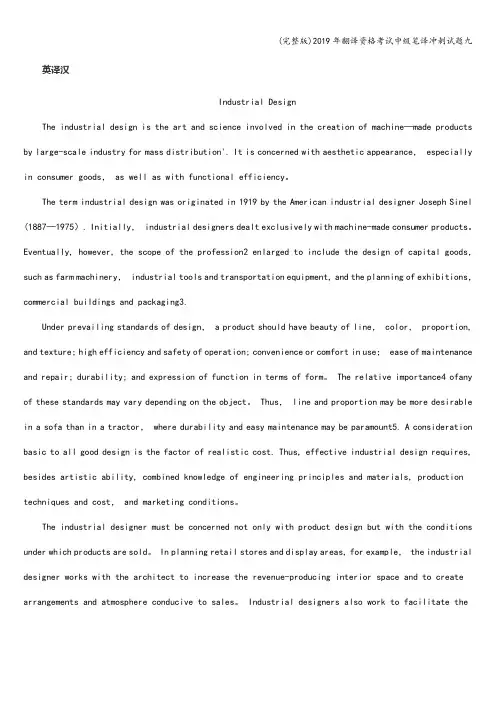
英译汉Industrial DesignThe industrial design is the art and science involved in the creation of machine—made products by large-scale industry for mass distribution'. It is concerned with aesthetic appearance, especially in consumer goods, as well as with functional efficiency。
The term industrial design was originated in 1919 by the American industrial designer Joseph Sinel (1887—1975). Initially, industrial designers dealt exclusively with machine-made consumer products。
Eventually, however, the scope of the profession2 enlarged to include the design of capital goods,such as farm machinery, industrial tools and transportation equipment, and the planning of exhibitions,commercial buildings and packaging3.Under prevailing standards of design, a product should have beauty of line, color, proportion, and texture; high efficiency and safety of operation; convenience or comfort in use; ease of maintenance and repair; durability; and expression of function in terms of form。
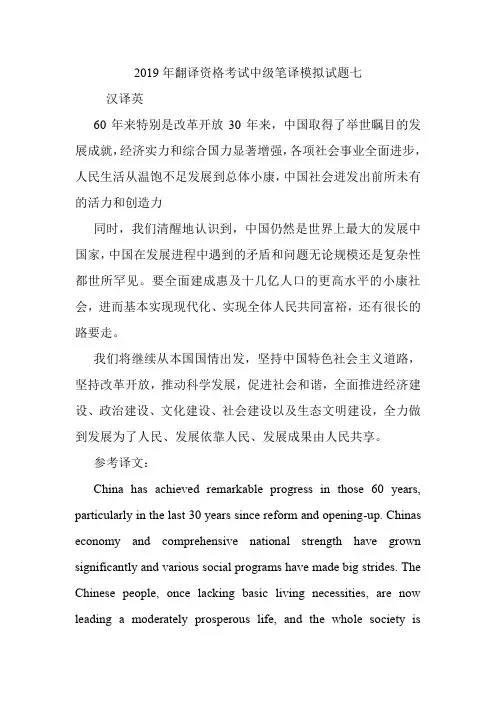
2019年翻译资格考试中级笔译模拟试题七汉译英60年来特别是改革开放30年来,中国取得了举世瞩目的发展成就,经济实力和综合国力显著增强,各项社会事业全面进步,人民生活从温饱不足发展到总体小康,中国社会迸发出前所未有的活力和创造力同时,我们清醒地认识到,中国仍然是世界上最大的发展中国家,中国在发展进程中遇到的矛盾和问题无论规模还是复杂性都世所罕见。
要全面建成惠及十几亿人口的更高水平的小康社会,进而基本实现现代化、实现全体人民共同富裕,还有很长的路要走。
我们将继续从本国国情出发,坚持中国特色社会主义道路,坚持改革开放,推动科学发展,促进社会和谐,全面推进经济建设、政治建设、文化建设、社会建设以及生态文明建设,全力做到发展为了人民、发展依靠人民、发展成果由人民共享。
参考译文:China has achieved remarkable progress in those 60 years, particularly in the last 30 years since reform and opening-up. Chinas economy and comprehensive national strength have grown significantly and various social programs have made big strides. The Chinese people, once lacking basic living necessities, are now leading a moderately prosperous life, and the whole society isshowing unprecedented dynamism and creativity.We are keenly aware, however, that China remains the worlds largest developing country. The difficulties and problems that we face in development are rarely seen in any other part of the world in terms of their scale and complexity. We still have a long way to go before we can build, in a comprehensive way, a moderately prosperous society of a higher level that will benefit the more than one billion Chinese people, and then achieve basic modernization and bring common prosperity to all our people.We will, in the light of our national conditions, continue to follow the path of socialism with Chinese characteristics, persist in reform and opening-up, promote scientific development and social harmony, and achieve all-round progress in the economic, political, cultural, social and environmental fields. We will ensure that our development is for the people and by the people and the fruits of development are shared among the people.。
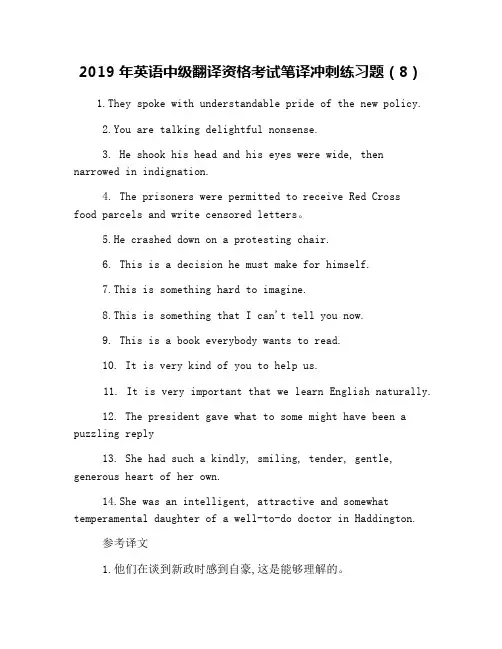
2019年英语中级翻译资格考试笔译冲刺练习题(8)1.They spoke with understandable pride of the new policy.2.You are talking delightful nonsense.3. He shook his head and his eyes were wide, then narrowed in indignation.4. The prisoners were permitted to receive Red Crossfood parcels and write censored letters。
5.He crashed down on a protesting chair.6. This is a decision he must make for himself.7.This is something hard to imagine.8.This is something that I can't tell you now.9. This is a book everybody wants to read.10. It is very kind of you to help us.11. It is very important that we learn English naturally.12. The president gave what to some might have been a puzzling reply13. She had such a kindly, smiling, tender, gentle, generous heart of her own.14.She was an intelligent, attractive and somewhat temperamental daughter of a well-to-do doctor in Haddington.参考译文1.他们在谈到新政时感到自豪,这是能够理解的。
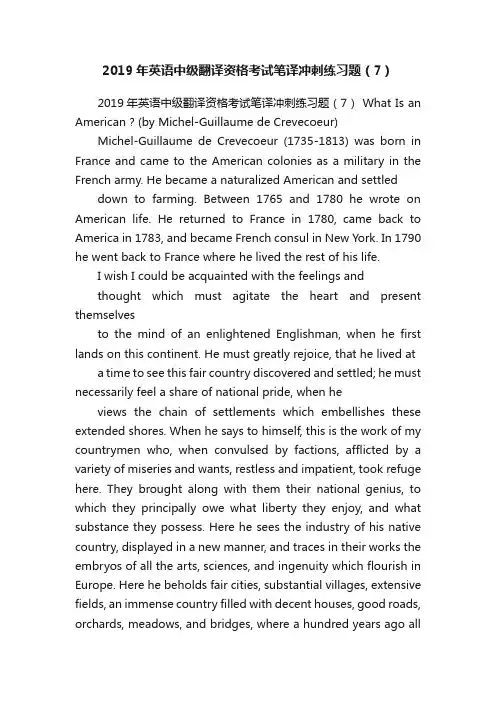
2019年英语中级翻译资格考试笔译冲刺练习题(7)2019年英语中级翻译资格考试笔译冲刺练习题(7) What Is an American ? (by Michel-Guillaume de Crevecoeur)Michel-Guillaume de Crevecoeur (1735-1813) was born in France and came to the American colonies as a military in the French army. He became a naturalized American and settled down to farming. Between 1765 and 1780 he wrote on American life. He returned to France in 1780, came back to America in 1783, and became French consul in New York. In 1790 he went back to France where he lived the rest of his life.I wish I could be acquainted with the feelings andthought which must agitate the heart and present themselvesto the mind of an enlightened Englishman, when he first lands on this continent. He must greatly rejoice, that he lived ata time to see this fair country discovered and settled; he must necessarily feel a share of national pride, when heviews the chain of settlements which embellishes these extended shores. When he says to himself, this is the work of my countrymen who, when convulsed by factions, afflicted by a variety of miseries and wants, restless and impatient, took refuge here. They brought along with them their national genius, to which they principally owe what liberty they enjoy, and what substance they possess. Here he sees the industry of his native country, displayed in a new manner, and traces in their works the embryos of all the arts, sciences, and ingenuity which flourish in Europe. Here he beholds fair cities, substantial villages, extensive fields, an immense country filled with decent houses, good roads, orchards, meadows, and bridges, where a hundred years ago allwas wild, woody, and uncultivated !. . . . . .After a foreigner from any part of Europe is arrived,and become a citizen; let him devoutly listen to the voice of our great parent, which says to him, “Welcome to my shores, distressed European; bless the hour in which thou didst see my verdant fields, my fair navigable rivers, and my green mountains ! - If thou wilt work, I have bread for thee; if thou wilt be honest, sober and industrious, I have greater rewards to confer on thee - ease and independence. I will give thee fields to feed and clothe thee; a comfortable fire-side to sit by, and tell thy children by what means thou hast prospered; and a decent bed to repose on. I shall endow thee, beside, with the immunities of a freeman. If thou wilt carefully educate thy children, teach them gratitude to God, and reverence to that government, that philanthropic government, which has collected here so many men and made them happy, I will also provide for thy progeny: and toevery good man this ought to be the most holy, the most powerful, the most earnest wish he can possibly form, as well as the most consolatory prospect when he dies. Go thou, and work and till; thou shalt prosper, provided thou be just, grateful and industrious.”注释:settle, (移民)定居,安家;agitate使激动,刺激;enlightened, 开明的;fair, 美丽的;embellish,装饰,装点;factions: (宗教)的派系;thou=you, thy= your, thee为you的宾语。
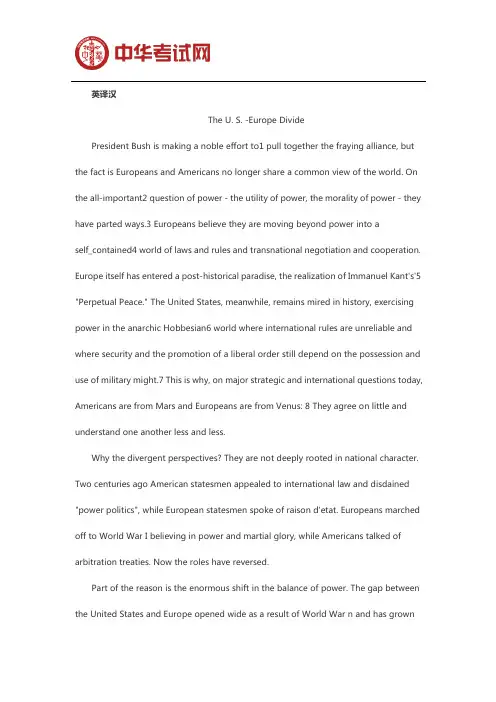
英译汉The U. S. -Europe DividePresident Bush is making a noble effort to1 pull together the fraying alliance, but the fact is Europeans and Americans no longer share a common view of the world. On the all-important2 question of power - the utility of power, the morality of power - they have parted ways.3 Europeans believe they are moving beyond power into aself_contained4 world of laws and rules and transnational negotiation and cooperation. Europe itself has entered a post-historical paradise, the realization of Immanuel Kant's'5 "Perpetual Peace." The United States, meanwhile, remains mired in history, exercising power in the anarchic Hobbesian6 world where international rules are unreliable and where security and the promotion of a liberal order still depend on the possession and use of military might.7 This is why, on major strategic and international questions today, Americans are from Mars and Europeans are from Venus: 8 They agree on little and understand one another less and less.Why the divergent perspectives? They are not deeply rooted in national character. Two centuries ago American statesmen appealed to international law and disdained "power politics", while European statesmen spoke of raison d'etat. Europeans marched off to World War I believing in power and martial glory, while Americans talked of arbitration treaties. Now the roles have reversed.Part of the reason is the enormous shift in the balance of power. The gap between the United States and Europe opened wide as a result of World War n and has grownwider in the past decade. America's unparalleled military strength has predictably given it a greater propensity9 to use force and a more confident belief in the moral legitimacy of power. Europe's relative weakness has produced an aversion to force as a tool of international relations. Europeans today, like Americans 200 years ago, seek a world where strength doesn't matter so much, where unilateral action by powerful nations is forbidden, where all nations regardless of their strength are protected by commonly agreed rules of behavior. 10 For many Europeans, progress toward such a world is more important than eliminating the threat posed by Saddam Hussein. For Americans, the Hobbesian world is not so frightening. Unilateralism is naturally more attractive to those with the capacity to act unilaterally. And international law constrains strong nations more than it does the weak. Because of the disparity of power, Americans and Europeans even view 11 threats differently. A person armed only with a knife may decide that a bear prowling the forest is a tolerable danger - trying to kill the bear is riskier than lying low and hoping the bear never attacks. But a person with a rifle will likely make a different calculation: Why should he risk being mauled to death if he doesn't need to? Americans could imagine successfully invading Iraq and toppling Saddam, and therefore more than 70 percent of Americans favored that action.Europeans, not surprisingly, found it unimaginable and frightening.But it is not just the power gap that divides Americans and Europeans today. Europe's relatively pacific strategic culture is also the product of its war-like past. The European Union is a monument to Europe's rejection of the old power politics. Whoknows the dangers of Machtpolitik better than a French or German citizen? As the British diplomat Robert Cooper recently noted, Europe today lives in a "postmodern system" that does not rest on12 a balance of power but on "the rejection of force" and on " self-enforced rules of behavior. " Raison d'etat has been "replaced by a moral consciousness." American realists may scoff, but within the confines of Europe the brutal laws of power politics really have been repealed. Since World War II European society has been shaped not by the traditional exercise of power but by the unfolding of a geopolitical miracle: The German lion has lain down with13 the French lamb. The new Europe has succeeded not by balancing power but by transcending power. And now Europeans have become evangelists for their "postmodern" gospel of international relations. The application of the European miracle to the rest of the world has become Europe's new mission.This has put Europeans and Americans on a collision course. Americans have not lived the European miracle. They have no experience of promoting14 ideals and order successfully without power. Their memory of the past 50 years is of a Cold War struggle that was eventually won by strength and determination, not by the spontaneous triumph of "moral consciousness. 15 As good children of the Enlightenment, Americans believe in human perfectibility. But Americans from Donald Rumsfeld to Madeleine Albright also believe that global security and a liberal order depend on the United States —that "indispensable nation" - wielding its power in the dangerous, Hobbesian world that still flourishes, at least outside Europe.There is no sure cure16 for this transatlantic divergence. Those on both sides of the Atlantic who implore Europe to increase its military capabilities are right - though a Europe that has so little belief in power is unlikely to spend the money to get more of it. Those who ask Americans to show some generosity of spirit, what the Founders called "a decent respect for the opinion of mankind," are also right. The United States should honor multilateralism and the rule of law when it can, and try to build some international political capital for those times when unilateral action is unavoidable. But even if it does, will Europeans show the necessary tolerance for American power?参考译文欧美的分歧布什总统正竭力将摩擦不断的联盟扯到一起,然而事实上欧美已经不再拥有共同的世界观。
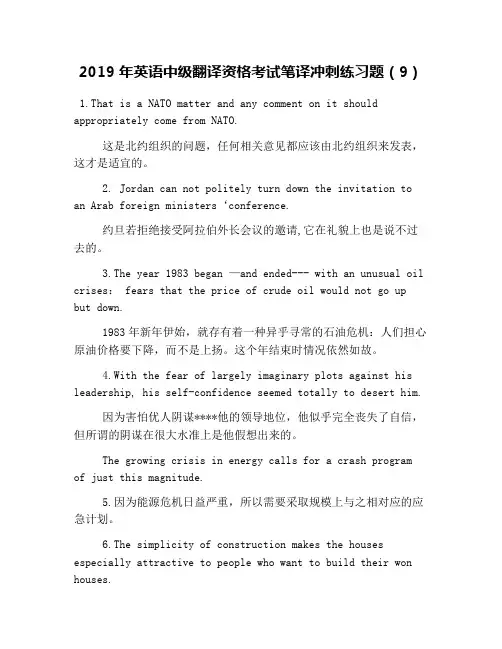
2019年英语中级翻译资格考试笔译冲刺练习题(9)1.That is a NATO matter and any comment on it should appropriately come from NATO.这是北约组织的问题,任何相关意见都应该由北约组织来发表,这才是适宜的。
2. Jordan can not politely turn down the invitation to an Arab foreign ministers‘conference.约旦若拒绝接受阿拉伯外长会议的邀请,它在礼貌上也是说不过去的。
3.The year 1983 began —and ended--- with an unusual oil crises: fears that the price of crude oil would not go up but down.1983年新年伊始,就存有着一种异乎寻常的石油危机:人们担心原油价格要下降,而不是上扬。
这个年结束时情况依然如故。
4.With the fear of largely imaginary plots against his leadership, his self-confidence seemed totally to desert him.因为害怕优人阴谋****他的领导地位,他似乎完全丧失了自信,但所谓的阴谋在很大水准上是他假想出来的。
The growing crisis in energy calls for a crash program of just this magnitude.5.因为能源危机日益严重,所以需要采取规模上与之相对应的应急计划。
6.The simplicity of construction makes the houses especially attractive to people who want to build their won houses.这种房屋结构对于想建造私人房屋的人们特别有吸引力。
英译汉Translate the following sentence into Chinese.1. You can learn something about a place by reading a travel book, but you learn more when you actually travel there.2. There is a combination of enthusiasm and excitement that is felt while travelling. New foods, different faces, foreign languages, and interesting customers all fascinate the travelers.3. To travel by Greyhound is easy, cheap and convenient, though not so fast as travelling by plane or so comfortable as by train.4. In January New England was covered with thick snow and ice while Miami was warm with flowers in blossoms.5. Sparsely populated by the descendants of its original inhabitants, Amhem Land is accessible through specialized operators (some of them Aboriginal owned) which give travelers rare and unforgettable insights into indigenous Australian art and culture.6. The island continent of Australia offers an enormous array of scenic variety and you can take the opportunity of enjoying just about every adventure you've ever dreamed possible.7. The idea of going to Europe just for scenery is my idea of a misspent journey when there are so many different cultures to explore and historical and artistic experiences to absorb.8. The tourists' favorite visiting places vary from person to person, some want to visit beautiful mountains and rivers, others like to meet local people.9. Mark Twain was so impressed that he said of Montreal "you can't throw a brick without hitting a church" .10. The villages and towns were usually perched on the edge [of the farms] so as not to waste arable soil and because there was a need, before the High dam tamed the Nile, to live beyond the reach of the annual floods答案1.看旅游书籍可以使人对一个地方知道点皮毛,但要真正了解那个地方,还得亲自去那里游历一番。
翻译资格考试中级笔译冲刺题The field of medicine has always attracted its share of quacks and charlatans — disreputable women and men with little or no medical knowledge who promise quick cures at cheap prices The reasons why quackery thrives even in modern times are easy to findTo begin with, pain seems to be a chronic human condition A person whose body or mind “hurts” will often pay any amount of money for the promise of relief Second, even the best medical treatment cannot cure all the ills that beset men and women People who mistrust ordislike the truths that their physicians tell them often turn to more sympathetic earsMany people lack the training necessary to evaluate medical claims Given the choice between (a) a reputable physician who says a cure for cancer will be long, expensive and may not work at all, and (b) a salesperson who says that several bottles of a secret formula “snake oil” will cure not only cancer but tuberculosis as well, some individuals will opt for “snake oil”Many “snake oil” reme dies are highly laced with alcohol or narcotic drugs Anyone who drinks them may get so drunk or stoned that they drown their pains in the rising tide of pleasant intoxicationLittle wonder that “snake oil” is a popular cure-all for minor aches and hurts! B ut let there be no misunderstandings A very few “home remedies” actually work However, most remedies sold by quacks are not only useless, but often can be harmful as wellIn this passage, a quack or a charlatan is someone who ____A has a special abilityB has little knowledgeC is not a good doctorD pretends to be a doctorThe sentence “pain seems to be a chronic human condition” means pain seems to ____A be very seriousB be very difficultC last for a long timeD be always happeningQuackery thrives even in modern times because ____patients pay any amount of moneypatients do not like their physiciansquacks say that they can help patientsbest medical treatment costs very muchPeople who seek the advice of quacks and charlatans are those who ____A are poorly educatedB are highly educatedC dislike medical treatmentsD mistrust physicians’ truthsTo evaluate medical claims, one must ____A turn to reputable doctorsB make an adequate choiceC have the necessary trainingD disbelieve promise of reliefAccording to the author, a very few home remedies are ____A uselessB harmfulC pleasantD effectiveWhich of the following statements is NOT true?A Quacks are really sympatheticB “Snake oil” does not workC Doctors cannot cure all illsD Patients are often impatientMany individuals opt for “snake oil” because they ____A are misled by a secret formulaB cannot afford a treatmentC lack medical knowledgeD do not trust physicians“Snake oil” is a popul ar cure-all for minor aches and hurts because it has ____A actually workedB some fruit stonesC been misunderstoodD alcohol or narcotic drugsWhich of the following would be the best title of this passage?A Distrust of PhysiciansB Medical TreatmentC Snake Oil RemediesD Guard Against Quackery参考答案:D D C D C D A A D D。
英译汉Impacts of Climatic Changes on Livestock: A Canadian Perspective There are more than 90,000 livestock operations in Canada, which accounted for more than $17 billion in farm cash receipts in 20001.Despite the economic importance of livestock operations to Canada2, relatively few studies have examined how they could be impacted by climate change. 3Temperature is generally considered to be4 the most important bioclimatic factor for livestock. Warmer temperatures are expected to present both benefits and challenges to livestock operations. Benefits would be particularly evident during winter, when 5 warmer weather lowers feed requirements, increases survival of the young, and reduces energy costs. Challenges would increase during the summer, however, when heat waves can kill animals. For example, large numbers of chicken deaths are commonly reported in the United States during heat waves. 6 Heat stress also adversely affects milk production, meat quality and dairy cow reproduction. In addition, warmer summer temperatures have been shown to suppress appetites in livestock and hence reduce weight gain. For example, a study conducted in Appalachia found that a 5︒C increase in mean summer temperature7 caused a l0% decrease in cow, calf and dairy operations.Provided there is adequate moisture, warmer temperatures and elevated CO2 concentrations are generally expected to increase growth rates in grasslands and pastures. 8 It is estimated that a doubling of9 atmospheric CO2 would increasegrassland productivity by an average of 17%, with greater increases projected for colder regions and moisture-limited grassland systems. However, study results tend to vary greatly with location, and changes in species composition may affect the actual impacts10 on livestock grazing. For instance, studies have noted future climate changes, particularly extreme events, may promote the invasion of alien species into grasslands, which could reduce the nutritional quality of the grass.An increase in severe moisture deficits due to drought may require producers to reduce their stock of grazing cattle to preserve their land, as exemplified by the drought of 2001 when many Prairie producers had to cull their herds. For the 2002 season, it was predicted that many pastures would be unable to support any grazing, while others would be reduced to 20-300/o of normal herd capacity.There is relatively little literature available on the impacts of extreme climate events on livestock. Nevertheless, storms, blizzards and droughts are an important concern for livestock operations. In addition to the direct effects on animals, storms may result in power outages that can devastate farms that are heavily dependent upon electricity for daily operations. This was exemplified by" the 1998 ice storm in eastern Ontario and southern Quebec, when the lack of power left many dairy farms unable to use their milking machines. This threatened the health of the cows (due to potential mastitis) and caused significant revenue losses. Milk revenue was also lost through the inability to store the milk at the proper temperature.12 Furthermore, the lack of electricity made itdifficult to provide adequate barn ventilation and heating, thereby making the animals more susceptible to illness.词汇1.cash receipts现金收入2.bioclimatic factor生物气候因素3.heat wave/heat stress热浪4.C02 concentration二氧化碳浓度5.grassland/pasture/prairie草原,草地,草场6.grazing放牧7.cull拣选,剔除8.herd capacity放牧能力9.mastitis乳突炎10.revenue收入参考译文气候变化对家畜的影响——加拿大的视角加拿大有9万多家家畜企业,2000年现金收入超过170亿美元。
2019年英语中级翻译资格考试笔译冲刺练习题(7) What Is an American ? (by Michel-Guillaume de Crevecoeur)
Michel-Guillaume de Crevecoeur (1735-1813) was born in France and came to the American colonies as a military in the French army. He became a naturalized American and settled
down to farming. Between 1765 and 1780 he wrote on American life. He returned to France in 1780, came back to America in 1783, and became French consul in New York. In 1790 he went back to France where he lived the rest of his life.
I wish I could be acquainted with the feelings and
thought which must agitate the heart and present themselves
to the mind of an enlightened Englishman, when he first lands on this continent. He must greatly rejoice, that he lived at
a time to see this fair country discovered and settled; he must necessarily feel a share of national pride, when he
views the chain of settlements which embellishes these extended shores. When he says to himself, this is the work of my countrymen who, when convulsed by factions, afflicted by a variety of miseries and wants, restless and impatient, took refuge here. They brought along with them their national genius, to which they principally owe what liberty they enjoy, and what substance they possess. Here he sees the industry of his native country, displayed in a new manner, and traces in their works the embryos of all the arts, sciences, and ingenuity which flourish in Europe. Here he beholds fair cities, substantial villages, extensive fields, an immense country filled with decent houses, good roads, orchards, meadows, and bridges, where a hundred years ago all was wild, woody, and uncultivated !
. . . . . .
After a foreigner from any part of Europe is arrived,
and become a citizen; let him devoutly listen to the voice of our great parent, which says to him, “Welcome to my shores, distressed European; bless the hour in which thou didst see
my verdant fields, my fair navigable rivers, and my green mountains ! - If thou wilt work, I have bread for thee; if
thou wilt be honest, sober and industrious, I have greater rewards to confer on thee - ease and independence. I will
give thee fields to feed and clothe thee; a comfortable fire-side to sit by, and tell thy children by what means thou hast prospered; and a decent bed to repose on. I shall endow thee, beside, with the immunities of a freeman. If thou wilt
carefully educate thy children, teach them gratitude to God, and reverence to that government, that philanthropic government, which has collected here so many men and made
them happy, I will also provide for thy progeny: and to
every good man this ought to be the most holy, the most powerful, the most earnest wish he can possibly form, as well as the most consolatory prospect when he dies. Go thou, and work and till; thou shalt prosper, provided thou be just, grateful and industrious.”
注释:
settle, (移民)定居,安家;agitate使激动,刺激;enlightened, 开明的;fair, 美丽的;embellish,装饰,装点;factions: (宗教)的
派系;thou=you, thy= your, thee为you的宾语。
-st为动词词尾(现
代英语中已不用);navigable, 可通航的;immunities (豁免)特权。
何为美国人?。